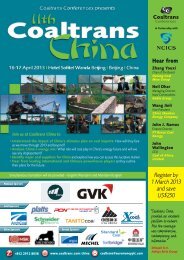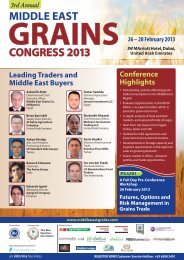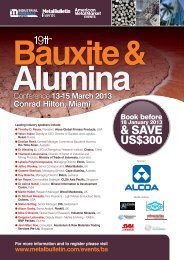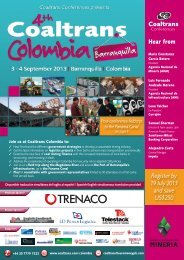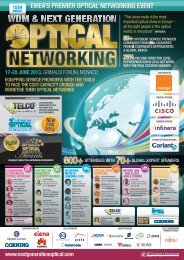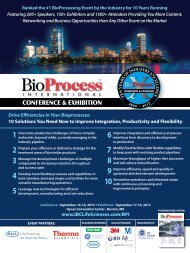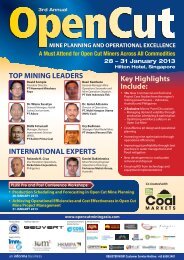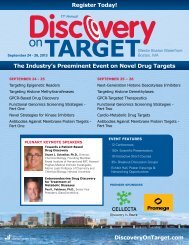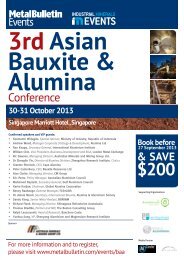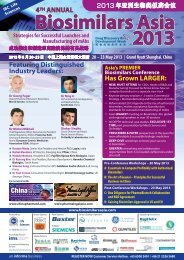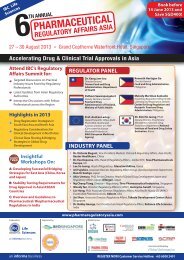Cell Line Development & Engineering
Cell Line Development & Engineering
Cell Line Development & Engineering
You also want an ePaper? Increase the reach of your titles
YUMPU automatically turns print PDFs into web optimized ePapers that Google loves.
Monday, May 20, 2013 (continued)<br />
3:00 CASE STUDY • UNPUBLISHED DATA Proteomic Analysis of Chinese<br />
Hamster Ovary (CHO) <strong>Cell</strong>s<br />
To complement the recent genomic sequencing of Chinese hamster ovary<br />
(CHO) cells, proteomic analysis was performed on CHO cells including the<br />
cellular proteome, secretome, and glycoproteome using mass spectrometry<br />
and multiple strategies. A total of 6164 grouped proteins were identified. This<br />
first large-scale proteomic analysis enhances the knowledge base about CHO<br />
capabilities for recombinant expression and cell line engineering.<br />
Deniz Baycin Hizal, Ph.D., Chemical and Biomolecular <strong>Engineering</strong>,<br />
Johns Hopkins University<br />
3:30 Networking Refreshment Break and Poster/Exhibit Viewing<br />
Proliferation and Integration of Data Sets<br />
4:00 Integrated miRNA, mRNA and Protein Expression Analysis<br />
Reveals the Role of Post-Transcriptional Regulation in<br />
Controlling CHO <strong>Cell</strong> Growth Rate<br />
To investigate the role of microRNA (miRNA) in the regulation of Chinese<br />
hamster ovary (CHO) cell growth, qPCR, microarray and quantitative LC-MS/<br />
MS analysis were utilised for simultaneous expression profiling of miRNA, mRNA<br />
and protein. In this presentation, the biological processes found to be correlated<br />
with CHO cell growth rate is discussed and the analysis of multiple datasets to<br />
identify potential miRNA-mediated regulation demonstrated.<br />
Colin Clarke, Ph.D., Postdoc, National Institute for <strong>Cell</strong>ular Biotechnology,<br />
Dublin City University, Ireland<br />
4:30 UNPUBLISHED DATA Using Metabolite Profiling Data to Make a<br />
Difference to CHO <strong>Cell</strong> Bioprocesses<br />
Metabolite profiling offers an ‘omics approach that enables a very<br />
immediate read-out of the status of CHO cells in culture. From an<br />
integrated analysis of profile changes, interpretations can be attained of<br />
metabolic phenotype associated with growth and/or recombinant protein<br />
production. This presentation illustrates our molecular understanding of<br />
relationships between feeding, cellular metabolism and desirable phenotype<br />
in CHO cells.<br />
Alan Dickson, Ph.D., Director, Centre of Excellence in Biopharmaceuticals,<br />
Professor of Biotechnology, University of Manchester, United Kingdom<br />
5:00 UNPUBLISHED DATA Genome-Scale Analysis of Chinese Hamster<br />
Ovarian <strong>Cell</strong> <strong>Line</strong>s<br />
Over the past 15 years, microbe-based engineering has advanced through<br />
three major innovations: 1) genome sequencing, 2) genome-scale metabolic<br />
models, and 3) tools for genome editing. These have allowed engineers to<br />
identify cellular parts, simulate product synthesis, and manipulate host<br />
genomes to enhance production. Similar advances are now upon us in the<br />
engineering of CHO cell lines for bioprocessing.<br />
Bernhard Palsson, Ph.D., Principal Investigator, Galletti Professor of<br />
Bioengineering, Adjunct Professor Medicine, University of California, San Diego<br />
5:30 Cocktail Reception in Poster/Exhibit Hall<br />
Tuesday, May 21, 2013<br />
7:30 Coffee<br />
8:00 Chairman’s Opening Remarks<br />
Rodney Combs, M.S., Associate Research Fellow, Bioprocess R&D, Culture<br />
Process <strong>Development</strong>, World Wide Pharmaceutical Sciences, Pfizer Inc.<br />
Approaches to Improve Process and Product Quality<br />
8:15 CASE STUDY Clonality – Challenges, Approaches and<br />
Lessons Learned<br />
Abstract not available at time of print. Please visit<br />
www.IBCLifeSciences.com/<strong>Cell</strong><strong>Line</strong> for updates.<br />
Pamela Hawley-Nelson, Ph.D., Associate Director, Process <strong>Cell</strong> Culture,<br />
MedImmune<br />
8:45 Use of QPCR and DNA Sequencing Tools to Ensure<br />
Product Quality and Safety<br />
Quantitative PCR (Q-PCR) and DNA sequencing are tools that enable rapid,<br />
sensitive and precise quantitation, detection and identification of critical<br />
cellular and process impurities in cell culture manufacturing and product<br />
purification. Additionally, these tools can be utilized in development and<br />
characterization of production cell lines and in routine monitoring of cell line<br />
stability. In this presentation, the applications of these technologies and present<br />
data demonstrating the performance of assays for impurity assessment, cell line<br />
characterization, contaminant detection and identification are reviewed.<br />
Michael T. Brewer, Director, Head of Pharma Analytics, Life Technologies<br />
9:15 UNPUBLISHED DATA High-Throughput Product Quality Assays for<br />
<strong>Cell</strong> <strong>Line</strong> and Process <strong>Development</strong><br />
Here we present high-throughput (HTP) analytical assays to facilitate rapid<br />
product quality using 96-well plate formats. These HTP product quality assays<br />
include HTP protein quantitation followed by HTP protein purification and<br />
product quality analyses. With these HTP analytical product quality assays we can<br />
assess product quality in the early stage of clone screening, as well as expedite the<br />
cell line and process development.<br />
Shashi Prajapati, Ph.D., Senior Scientist, <strong>Cell</strong> Culture <strong>Development</strong>,<br />
High Throughput Analytical Group. Biogen Idec<br />
9:45 Networking Refreshment Break and Poster/Exhibit Viewing<br />
10:15 CASE STUDY • UNPUBLISHED DATA Impact of Media Components and<br />
Process Parameters on Product Color<br />
Health Authorities expect that companies monitor and control the color<br />
of liquid formulations of monoclonal antibodies. <strong>Cell</strong> culture conditions<br />
and media components were investigated and shown to influence color.<br />
Mechanisms that could explain these effects are discussed. Some process<br />
changes that reduced color also decreased titer, and strategies for reducing<br />
color which avoid productivity impact are discussed.<br />
Natarajan Vijayasankaran, Ph.D., Senior Engineer, Late Stage <strong>Cell</strong> Culture,<br />
Genentech, Inc.<br />
10:45 CASE STUDY • UNPUBLISHED DATA Viability and Productivity<br />
Improvement on Mammalian Fed Batch Culture<br />
Abstract not available at time of print. Please visit<br />
www.IBCLifeSciences.com/<strong>Cell</strong><strong>Line</strong> for updates.<br />
Wenge Wang, Ph.D., Senior Principal Scientist, Bioprocess Research and<br />
<strong>Development</strong>, Pfizer Inc.<br />
11:15 Technology Workshop<br />
A New Bench Scale Single-Use<br />
Bioreactor System<br />
<strong>Development</strong> of a new bench scale “rocker style” single use bioreactor<br />
will be described, with discussion of physical parameters for design space<br />
definition and performance measurement; with comparison to industry<br />
standard systems. Presentation will conclude with results from CHO<br />
batch culture trials for design validation, showing significant increases in<br />
achievable cell densities and cell productivity.<br />
Charles G. Golightly, Global Product Manager, Pall Life Sciences<br />
11:45 Luncheon and Poster/Exhibit Viewing<br />
Send a group of 3 and the 4th goes FREE!<br />
It’s a fact – attendees walk away with the most value when they<br />
experience it with a peer – there is just too much information available<br />
for one person to capture it all. As a result, we are pleased to offer a<br />
4th free registration when you register 3 people at the standard rate.<br />
For more information call our group sales advocate at 646-895-7445.<br />
4 Register Early for Best Savings • www.IBCLifeSciences.com/<strong>Cell</strong><strong>Line</strong> • 800-390-4078



